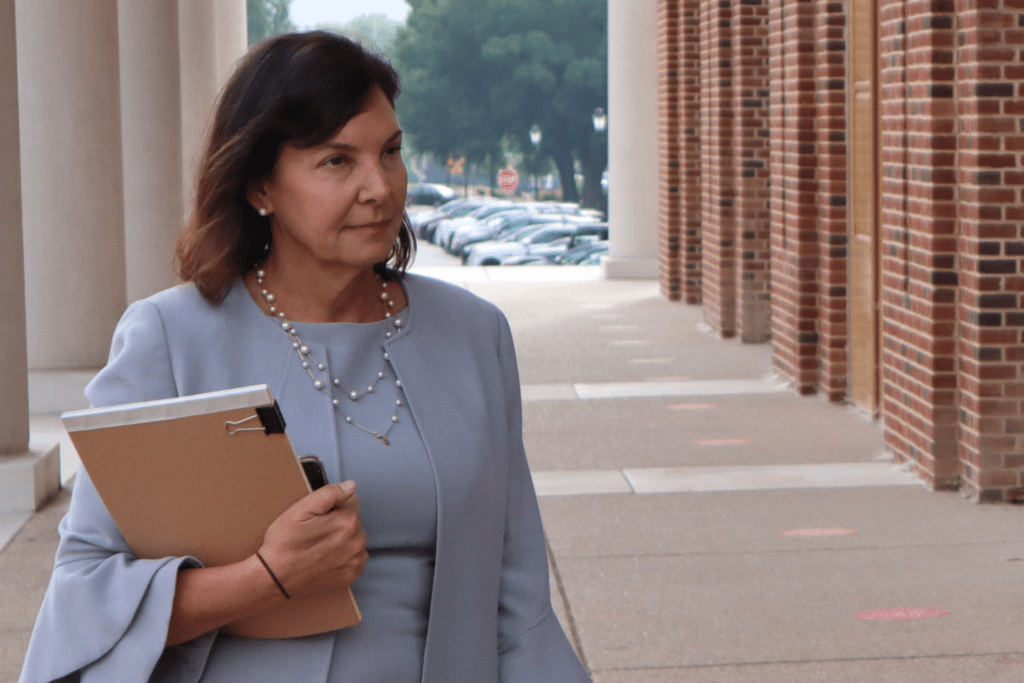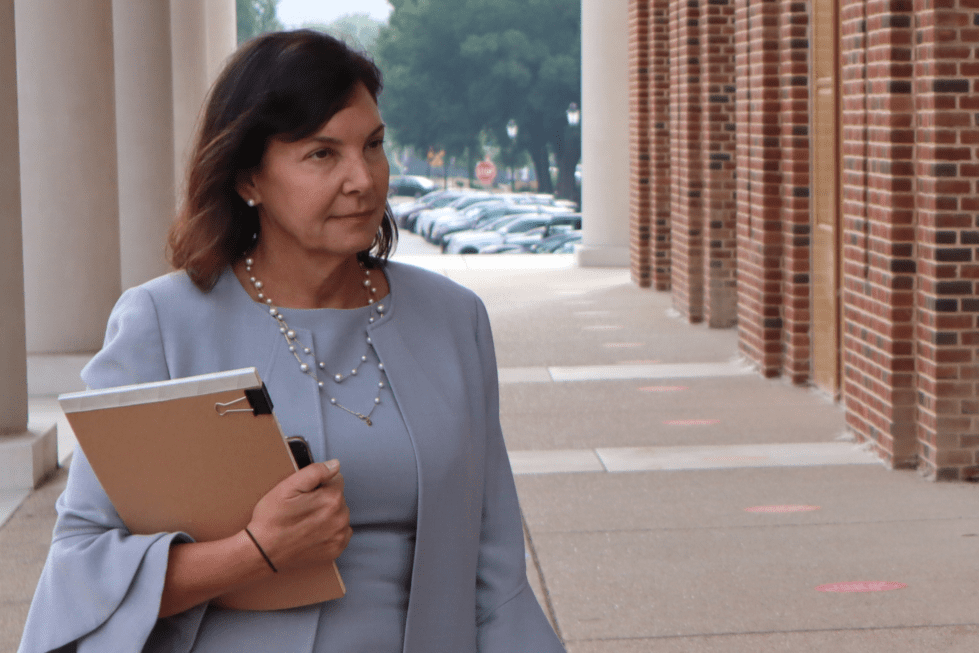
STATE AUDITOR KATHLEEN MCGUINESS ENTERS THE KENT COUNTY COURTHOUSE IN DOVER ON JUNE 24, 2022. (CHARLIE MEGGINSON/DELAWARE LIVE)
The State of Delaware rested its case against State Auditor Kathleen McGuiness Tuesday after eight and a half days of testimony.
McGuiness’ defense team began presenting its case and hopes to wrap it up by Wednesday afternoon.
Defense attorney Steve Wood asked Superior Court Judge William Carpenter to issue a judgment of acquittal on each of the five charges against McGuiness — a procedural move that’s typical for this kind of case.
Carpenter said Count 5, witness intimidation, was the charge most likely to be “in play,” but ultimately decided to reserve judgment until after the jury comes to a verdict.
His choices were to grant the motion, partially grant the motion, reserve judgment or deny the motion.
If the jury acquits McGuiness on all five charges, Wood’s request will be moot and Carpenter won’t have to make a decision.
If the jury hands down a guilty verdict on any of the charges, Carpenter has reserved the right to grant Wood’s request at that point and overrule the jury’s decision.
In addition to witness intimidation, McGuiness is charged with conflict of interest, felony theft, non-compliance with procurement law and official misconduct.
The ninth day of trial began with Ann Bayline, the chief administrative auditor who spoke about McGuiness’ desire to rebrand the office and make audits both accessible and understandable to the general public.
Later, Wood wrapped up his cross-examination of Franklin Robinson, the lead investigator on the case who, on multiple occasions, made sworn statements that turned out to be false.
Robinson falsely stated in a search warrant and again before a grand jury that McGuiness split payments to circumvent state procurement code and fired employees for “lack of work due to COVID,” only to hire her daughter as an intern in the office.
A ledger from the state’s Division of Accounting showed payments weren’t split and voluntary resignation letters from the three employees in question proved she didn’t lay anyone off to make room for her daughter.
Robinson maintains he never lied intentionally and wasn’t the author of the search warrant. He said more than once that his statements “could have been more accurate.”
The state’s final witness was Deborah Moreau, attorney for the state’s Public Integrity Commission, the agency responsible for adjudicating ethics issues within the executive branch.
She said McGuiness reached out to her in 2021 to ask if hiring her daughter violated any state ethics laws.
On its face, Moreau said, it’s not illegal to hire family members, insofar as the superior is not involved in the hiring process or day-to-day supervision of the family member, which McGuiness was.
Wood squabbled with Moreau during his cross-examination. On two occasions, he borrowed the judge’s copy of Title 29 of the Delaware Code, which says the only law relating to nepotism outlaws a financial benefit to either person.
After prosecutors rested their case, Wood called Amy Gulli, former deputy auditor.
Prior to her employment in the Delaware Office of the Auditor, Gulli led the special projects team in the office of Pennsylvania’s auditor general.
She joined McGuiness’ team hoping to engage in special projects, such as one to ensure Delaware prisons were not paying more than they needed to for inmates’ pharmaceuticals.
Those types of projects were not conducted during the 30-year tenure of McGuiness’ predecessor, Tom Wagner, something Gulli said long-time employees resisted because they refused to embrace change.
Gulli was also asked about a call she placed to Robinson to ask about an interview he conducted with a former casual/seasonal employee.
The employee, Virginia Bateman, was hired alongside McGuiness’ daughter Saylar McGuiness. She received a phone call from Robinson in June 2020, during which he claimed to be investigating the way casual/seasonal employees were handled during COVID-19.
Afterward, Bateman alerted McGuiness and Gulli to the call and expressed concern that she was being investigated, or that Robinson wasn’t who he said he was — something that would be concerning, considering how much he knew about Bateman.
After Bateman conveyed her concerns to Gulli and McGuiness, Gulli said she looked Robinson up on LinkedIn, something prosecutors pointed to earlier in the case as evidence McGuiness was aware of the investigation.
Robinson also received a phone call from a blocked number on the same day as his call with Bateman.
Using computer software only available to police, Robinson discovered the blocked call came from McGuiness’ phone.
The charges
- Conflict of Interest
- The state must prove beyond a reasonable doubt that McGuiness’ daughter, Saylar McGuiness, benefitted from her employment in a way that other similarly situated employees did not.
- Theft
- The state must prove beyond a reasonable doubt that Saylar McGuiness’ paychecks were deposited into a starter savings account on which the auditor is named as a co-sponsor and that Saylar shared those funds with McGuiness, or that McGuiness in someway benefitted financially from Saylar’s employment.
- Structuring
- The state must prove beyond a reasonable doubt that McGuiness knowingly and willfully fragmented payments to circumvent state procurement law.
- Official misconduct
- The state must prove beyond a reasonable doubt that McGuiness knowingly and willfully abused the powers of her office to enrich herself or disadvantage someone else.
- Intimidation
- The state must prove beyond a reasonable doubt that McGuiness knowingly induced, influenced or impeded a witness or victim by making a false statement, committing fraud or deceiving them with intent to affect their testimony or their availability to testify.
Trial of State Auditor Kathy McGuiness
If found guilty, McGuiness faces between zero and 13 years in prison.
Tuesday marks the ninth day of the trial.
Wood said during court Tuesday he plans to rest his case around lunchtime Wednesday. Jurors will then take all the time they need to come to a verdict on each of the five charges.
Carpenter has said he’d like to wrap the case up before the long Independence Day weekend.
The trial marks the first time in Delaware history that a statewide-elected official has stood trial while in office.
Trial Day 1 | Trial Day 2 | Trial Day 3 | Trial Day 4 | Trial Day 5 | Trial Day 6 | Trial Day 7 | Trial Day 8
Charlie Megginson covers government and politics for Town Square LIVE News. Reach him at (302) 344-8293 or [email protected]. Follow him on Twitter @cmegginson4.
Share this Post




